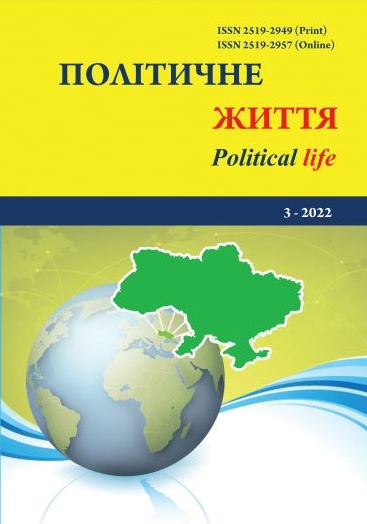Культурно-освітня стратегія КНР у зовнішній політиці
DOI:
https://doi.org/10.31558/2519-2949.2022.3.14Keywords:
“soft power”; “cultural soft powerAbstract
The relevance of the study is determined by the fact that, despite the relative elaboration of such topics as “soft power” and “cultural soft power” in China’s foreign (and internal) policy, the focus of previous studies was not directly focused on cultural and educational strategy of the PRC’s foreign policy.
The goal of the study is to analyze the cultural and educational strategy of the PRC’s foreign policy. The study is based on systemic and interdisciplinary approaches. There were also used general scientific methods such as induction and deduction, analysis and synthesis, comparison and analogy, generalization and abstraction, as well as such special scientific methods as descriptive and prognostic, sociological and content-analysis, historical-genetic and problem-chronological. Their use allowed us to reveal the nature and the prospects of educational and cultural strategy of the PRC’s foreign policy.
It was clearly demonstrated that according to Chinese researchers and Chinese leadership, the core of PRC’s «cultural soft power» should be the elements of China’s socialist and traditional culture, adapted to modern times. They believe that, while China’s «cultural soft power» is being built, it should be maintained the necessary balance between socialist and traditional national values, modern elements of mass culture and universal human values, which all together will most effectively ensure inside and outside the country the attractiveness of China’s national culture.
It was established that PRC’s cultural foreign policy relies on various resources and is deployed in various fields, including social, humanitarian and natural sciences, literature, art, television, radio, cinema, sports, tourism, etc. The forms of such cooperation are also characterized by considerable diversity: Chinese language courses, cultural festivals, scientific schools and conferences, holidays, exhibitions, exchanges of delegations and creative teams. Great importance is attached to humanitarian exchanges: cultural (in particular, the promotion of national “cultural brands”, including Beijing opera, Chinese circus and martial arts) and educational (including creation of most favorable conditions for foreign students and professors in PRC).
References
Абрамов В.А. Императивный потенциал «мягкой силы» в стратегиях внутреннего и внешнего развития КНР. Вестн. ЧитГУ. 2010. № 3 (60). С. 8–15.
Актамов И.Г., Бадмацыренов Т.Б. «Мягкая сила» Китая: образовательные стратегии внешнеполитического влияния. Власть. 2019. Том 27. С. 231–236.
В нежных объятиях дракона? Мягкая сила Китая в Казахстане. Алматы: ОФ «Синопсис: Центр изучения Китая и Центральной Азии». 2018. 84 с.
Гарбарт М.И. «Мягкая сила с китайской спецификой»: основный особенности китайского подхода к концепции на современном этапе. Вестн. Забайкал. гос. ун-та. 2019. Т.25. №1. С. 46–53.
Журавлёва Е.В. Стратагема красотки: теории «Мягкой силы» с китайской спецификой. Вестник Российского университета дружбы народов. Серия: Международные отношения. 2016. №.1. С. 17–31.
Кучинская Т.Н. Китайская модель мягкой силы: современные трансформации. Дискурс Пи. 2017. №.2 (27). С. 103–109.
Ломова Т.Е. Внешняя культурная политика Японии и Китая в современном мире. Россия и АТР. 2019. №.3. С. 52–70.
Тарабарко К.А. «Мягкая сила» культуры: эволюция концепции в трудах китайских учёных. Исторические, философские, политические и юридические науки, культурология и искусствоведение. Вопросы теории и практики. Тамбов : Грамота, 2016. № 7(69). Ч. 2. C. 181–184.
Ху Цзиньтао. Доклад на XVII Съезде КПК. Жэньминь жибао: web-site. 25.10.2007. URL: http://russian.people.com.cn/31521/6290184.html
Цзи Юешэн. Приоритеты внешней культурной политики Китая в условиях глобализации. Власть. 2017. Том 25. № 10. С. 148–154.
Constitution of the People’s Republic of China. The National People’s Congress of the People’s Republic of China : web-site. 11-20-2019. URL: http://www.npc.gov.cn/englishnpc/constitution2019/201911/ 1f65146fb6104dd3a2793875d19b5b29.shtml
Full text of Hu Jintao’s report at 18th Party Congress. Embassy of the People’s Republik of China in the United States of America : web-site. 2012/11/27. URL: https://www.mfa.gov.cn/ce/ceus/eng/zt/18th_CPC_National_ Congress_Eng/t992917.htm
Sharma Yojana. Confucius Institutes reappear under new names – Report. University World News : web-site. 30 June 2022. URL: https://www.universityworldnews.com/post.php?story=20220630152610783

